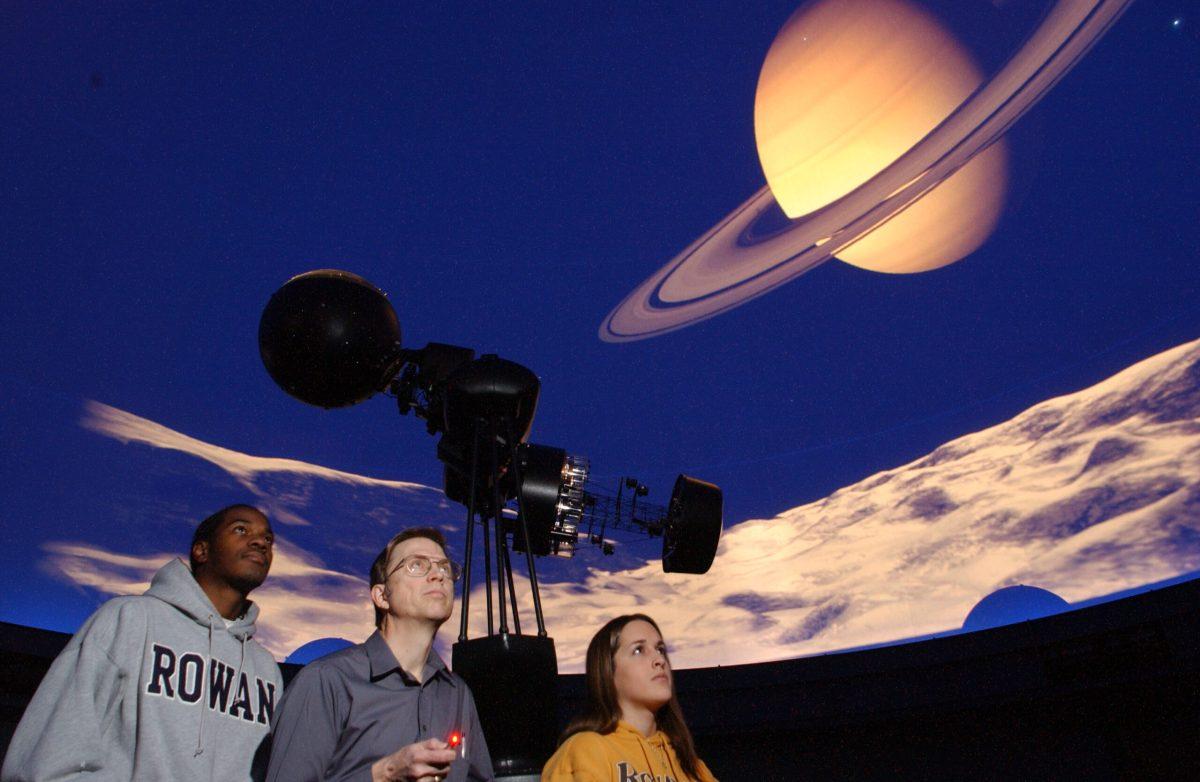Keith Johnson has two favorite planets — it’s a tie between Jupiter and Saturn. He likes how colorful and photogenic they are and that they each have multiple moons. Currently, he is also fond of Kepler-186f — a world circling a distant star — because it is one of the most Earth-like planets known.
“But I might change my mind when another one is discovered that’s more like us,” Johnson said.
As the director of the Rowan University Edelman Planetarium, Johnson has been using his passion for astronomy to teach eager visitors about the universe through the planetarium’s weekly shows and observation open houses, for the past 12 years. His interest in astronomy will culminate at the end of the spring 2016 semester, as Johnson is set to hang up his pointer and retire from the planetarium in June.
Although it’s where his professional career in astronomy will end, Johnson’s passion for astronomy started long before he came to Rowan.

In the mid-’50s, Johnson was a young boy living in Joliet, Illinois, 40 miles southwest of Chicago. The Soviet Union had just beaten the United States in the first leg of the Space Race by launching Sputnik 1 into orbit, and Americans were enthralled with the idea of exploring space.
Johnson recalls being mesmerized by the thought of exploring space, and by the first grade, he was already focused on his future career.
“Quite a few years ago, my mom dug out of her files — a little essay I wrote — ‘My First Trip to the Moon,’” Johnson said of his early interest in space.
Outside of school, he spent his free time reading sci-fi comic books and novels by Isaac Asimov, Arthur C. Clarke and Robert Heinlein. He also loved to visit the Adler Planetarium in Chicago because he could observe stars and learn about the universe.
“It put me in another world,” Johnson said. “I thought if I could work at a place like that, I’d be happy. I do, and I am.”
Johnson continued chasing his passion by studying physics at Luther College in Decorah, Iowa. He received his bachelor’s in 1969 and went on to earn his master’s degree in astronomy and astrophysics from the University of Arizona — a school that is part of the Association of Universities for Research in Astronomy.
To this day, one of his favorite memories was watching the sky through telescopes at Kitt Peak National Observatory in Arizona, during graduate school.
“You’re inside the dome, and you’re manipulating these huge instruments,” Johnson said. “You walk past all these domes and you always hear [classical and country western] music drifting out, and I just thought that was so peaceful and so wonderful.”
A year after graduation, Johnson married his wife Mary, whom he met in college. He later directed the planetarium at the University of Arkansas as well as the Fleischmann Planetarium at the University of Nevada. Johnson also served as treasurer of the International Planetarium Society, which conferenced in Japan, China and Scandinavia.
“Different planetarium positions have allowed us to live in different places,” Mary Johnson said. “It has been a wonderful journey, and I’m glad I’ve been able to go along for the ride.”
Johnson arrived at Rowan in 2004, when the planetarium was only for private use by astronomy students. In 2010, alumni Ric and Jean Edelman donated a grant to the science department, with the request that the planetarium be opened to the public.
Now, approximately 5,000 guests — many of whom are grade-school students — visit the Edelman Planetarium each year for observatory nights, star shows and family shows. Johnson prepares and presents these shows and events himself.
Johnson considers his job to be making astronomy something everyone can understand and enjoy — what his wife calls turning his hobby into his job.
“Researchers generally are not good at helping people understand why astronomers get so excited about what’s going on,” Johnson said. “There are stars that may be made out of diamond, there are black holes that we’re not sure where they lead; it’s an exciting field.”
Outside of astronomy, Johnson is an avid hiker, traveler, and classical music fan. Once his retirement is final, he anticipates traveling up to 90 percent of the time, at least according to his wife. The Johnsons are planning their first trip to Australia in the fall. They’re also considering a fourth visit to Europe and a first trip to Hawaii. After traveling, Johnson is considering volunteering at a library, as a part of what he says is “racking up his pointer and trying something new.”
“Keith has a rare combination of skills needed to run a planetarium and will be hard to replace,” Chairperson of the Physics and Astronomy Department Dr. Erick Guerra said of his retirement. “Thanks to Keith, the Edelman Planetarium is a special place for the school children from the region, our students, and the general public.”
For comments/questions about this story, email [email protected] or tweet @thewhitfeatures.

























































































































































!["Working with [Dr. Lynch] is always a learning experience for me. She is a treasure,” said Thomas. - Staff Writer / Kacie Scibilia](https://thewhitonline.com/wp-content/uploads/2025/04/choir-1-1200x694.jpg)










































